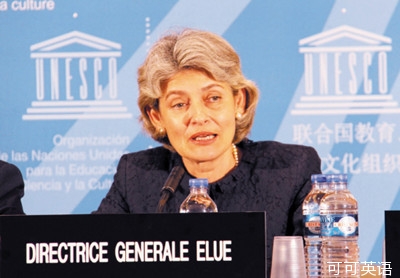(单词翻译:单击)
Message from Irina Bokova, Director-General of UNESCO, on the Occasion of the International Day of Peace
联合国教科文组织总干事伊琳娜·博科娃在国际和平日的致辞
21 September 2013
2013年9月21日
International Day of Peace, which we celebrate on 21 September, is devoted this year to peace education.
今年9月21日“国际和平日”的主题是和平教育。
This message embodies UNESCO’s founding values: since wars begin in the minds of women and men, it in the minds of women and men that the defences of peace must be constructed. Education is the foundation of any lasting peace. It is the driving force behind freedom and tolerance. It stems the tide of ignorance and mutual misunderstanding, the means by which disagreements all too often degenerate into violence. Education fosters the culture of dialogue that is necessary to resolve conflicts.
战争起源于人之思想,故务需于人之思想中筑起保卫和平之屏障。这句话体现了教科文组织的基本价值观。教育是持久和平的基石,是自由与宽容的原动力。它有助于消除往往使分歧升级为暴力的无知与缺乏相互了解。教育推动解决冲突所必需的对话文化。
That is why UNESCO campaigns for quality education for all going further than the basics of reading and writing. Education must encompass the teaching of human rights, living together and respect for others. Peace education is one of its key components. Every child in the world should know their rights, and learn their own history and that of other peoples, so as to be able to understand the equal dignity of cultures and draw lessons from the crimes and violence of the past. This vision is the key to tolerant citizenship in a globalized world. It requires a widespread effort to train teachers and design suitable school curricula. These principles inspire all of UNESCO’s work, in particular through the International Decade for the Rapprochement of Cultures (2013-2022), adopted by UNESCO’s General Conference and the United Nations General Assembly.
正因为此,教科文组织积极倡导不仅仅包括读写基本技能的全民良好教育。教育应涵盖人权、共同生活以及尊重他人的教育。和平教育是其中一个重要组成部分。全世界儿童都应该了解自己的权利并学习本民族及其他民族的历史– 从而能够理解所有文化具有同等尊严并从过去的罪行与暴力事件中吸取教训。这种理念对于全球化时代培育包容的公民意识至关重要。它要求大力培训教师并开发相应的学校课程。这些是教科文组织所有工作,特别是在教科文组织大会和联合国大会通过的国际文化和睦十年(2013-2022年)领域开展工作的指导原则。
Education is a fundamental human right, and there can be no justification for depriving anybody of that right. As we mobilize the potential of education to prevent war, we must ensure the quality and continuity of teaching, even in the event of conflict. This is the purpose of UNESCO’s work to protect schools and teachers, and to bring education to refugees and displaced persons. It is also, for UNESCO, the way to lay the foundations of future peace.
教育是一项基本人权,不得以任何理由剥夺任何人的这一权利。在努力发挥教育在预防战争方面的作用的同时,我们应确保教育的质量和连续性,即便是在发生冲突的情况下。这是教科文组织保护学校和教师以及为难民或流离失所的人们提供教育的意义之所在。它也是教科文组织为未来和平奠定基础的手段。
With this hope in mind, I call upon all Member States of UNESCO, governments and civil society organizations to join their forces, and to join us to make education a force for peace. We must give to future generations a culture of dialogue and build, through education, a world that is not only more connected, but also more compassionate.
怀着这种期望, 我呼吁教科文组织所有会员国、各国政府和公民社会组织携起手来,与我们一道努力使教育成为促进和平的力量。我们必须为后代人留下对话的文化并通过教育构建一个更为连通、也更加团结的世界。

更多精品翻译素材,敬请关注可可英语。


